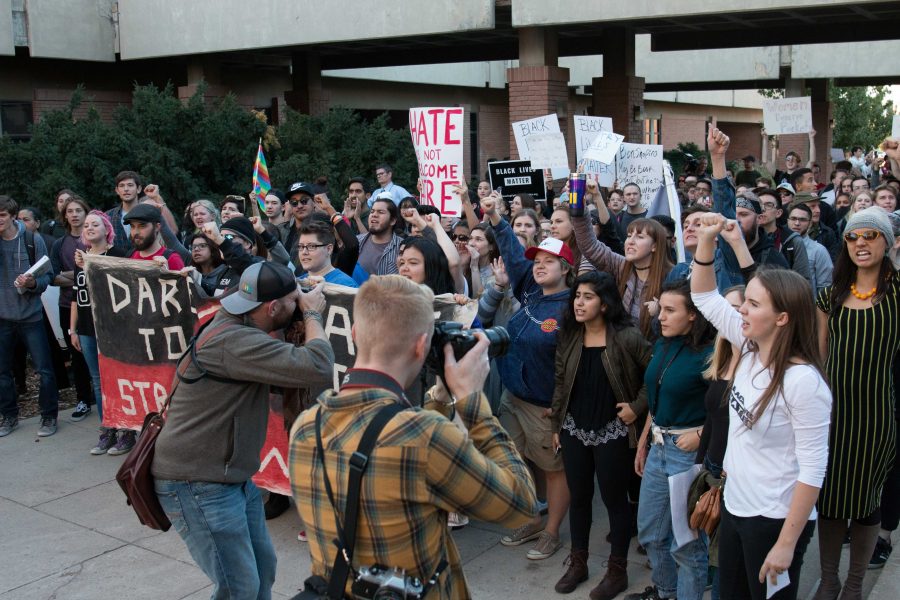The midterm elections are over. Let the liberal infighting commence.
With a majority in the House of Representatives and a presidential election on the horizon, Democrats must decide how to best confront President Trump. Meanwhile, as political divisions between Americans widen by the day, many struggle to address political controversies in their own day-to-day lives. Many are questioning the value of preserving civility in a polarizing, frightening era of American history. Increasing in regularity, stories of angry liberal protestors go viral — sodas are thrown, MAGA hats are stolen and abortion protestors are roundhouse kicked. By the end of 2018, look for the compilation video: “Leftists Gone Wild.”
Many prominent Democratic politicians have fallen on the opposite side of the divide. At the Democratic Party headquarters, Nancy Pelosi said, “We are not going after Republicans the way they went after us.” In a tweet Cory Booker said, “We must counter hate with love.” Even progressive hero Bernie Sanders said, in response to liberal protesters, “I am not a great fan of being rude or disrupting activities.”
My heart is broken over the horrific anti-Semitic acts in Pittsburg and for all affected by the evil shooting at The Tree Of Life Synagogue.
We must counter this hate with love and love's public face which is justice – tireless work for justice and peace.
— Cory Booker (@CoryBooker) October 28, 2018
These comments are no doubt well-intentioned. In the face of so much ugliness and violence, the instinct to call for peace and civility is understandable, and maybe even noble. Yet these statements put into serious doubt whether Democratic leaders are equipped to address the profound challenges our country will face over the next several years. Whether on Capitol Hill, in the newsroom or even in our everyday interactions, treating civility as the primary goal is not just unwise, but irresponsible.
Of course, there are some Republican tactics that the left should never adopt. Republicans are willing to defy the basic tenants of our democracy — one particularly egregious example of this is the systemic suppression of black voters in the Georgia election. Democrats should not accept the brazen dishonesty of the Trump administration as a political norm from members of either party. They should also not indulge in the fear-based, apocalyptic messaging that President Trump weaponized before the midterm elections. Future candidates should focus on a hopeful progressive message that goes far beyond criticizing President Trump.
Basing political decisions on some arbitrary standard of civility and mutual respect only allows for our politics to get more poisonous, however. I wish we lived in an era where bipartisanship could be a valuable tool for achieving political progress. Nostalgically longing for a different reality does not change our current climate. For the past two years, Republicans have shown no interest in working with Democrats or finding political solutions to benefit their constituents. The rights of racial minorities, women, LGBTQ people, immigrants and many other populations are continually under threat. It is much more important to protect the vulnerable — loudly, unapologetically and maybe even rudely — than to cater to politicians with no interest in doing the same.

Critics from both inside and outside of the left complain about the discourse of many progressives. Yet the most powerful man in the country ignores any standards of decency. President Trump routinely uses incendiary, offensive language to demean political opponents, members of the press and minority groups. His fear-mongering is either allowed or encouraged by Republican politicians, conservative media personalities and far-right groups. The constant race baiting and promotion of conspiracy theories are not just toxic to political discourse — it puts lives at risk. In one week, several prominent Democrats were mailed pipe bombs, a white nationalist tried to target a predominantly black church and a terrorist killed 11 people at a Jewish synagogue. President Trump’s rhetoric is uniquely inflammatory, and it simply has no equivalent on the left.
This is the problem with outlets treating Democrats and Republicans as similarly problematic, or vaguely referring to a “divided” political landscape. This kind of coverage suggests that calling out racism and bigotry is as toxic as racism and bigotry itself. Social media tends to exacerbate this issue. Abusive trolls are protected in the name of “free speech,” making platforms like Twitter untenable for many outspoken social justice advocates. Too many media outlets bend over backward to “hear both sides” without pointing out why one side is inherently different than the other. Promoting these false equivalencies is irresponsible — it emboldens hateful speech and expects the marginalized to engage with people who openly despise them.
It is time to question any narrative that treats political moderation as a moral high ground. This kind of philosophy values politeness over anything else, including common sense. I have no interest in finding common ground with a person who thinks that separating children from their mothers is a justifiable immigration policy. We can debate whether some of the more petty forms of protest are actually productive, yet these actions must be put into perspective. Refusing to serve members of the Trump administration at a restaurant is impolite. It is also worlds away from the bigotry and dishonesty that has become the White House’s modus operandi.
The midterm elections proved that many Americans, especially young people, are more civically engaged than ever. While voting and volunteering are essential, meaningful political participation does not have to be centered on elections. Political protests and activism have great capacity to enact social change, and Sanders’ comment on civility entirely misses the point of these movements — they are intentionally rude and disruptive. Putting civility on a pedestal ignores history. Even nonviolent political organizing is often meant with profound resistance from those interested in protecting the status quo. In fact, resistance is a sign that these ideas are worth fighting for. When they go low, we don’t wait for them to go high.


